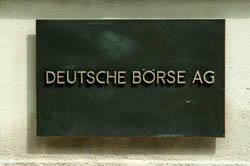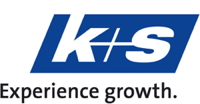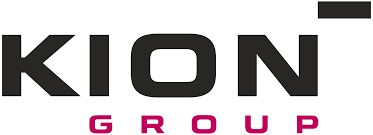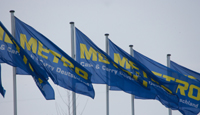ACTIONS CORNER
Deutsche Börse AG: Invest in Corporate Governance
 Deutsche Börse announced that it will acquire a majority share of approximately 80% in Institutional Shareholder Services Inc. (ISS). The transaction values ISS at 2,275m USD on a cash and debt-free basis. Genstar Capital LLC and the current management of ISS will continue to hold a stake of approximately 20% of ISS. The transaction is expected to close in the first half of 2021, subject to customary closing conditions and regulatory approvals. Deutsche Börse plans to finance the acquisition with a debt component of 1 bn EUR and cash.
Deutsche Börse announced that it will acquire a majority share of approximately 80% in Institutional Shareholder Services Inc. (ISS). The transaction values ISS at 2,275m USD on a cash and debt-free basis. Genstar Capital LLC and the current management of ISS will continue to hold a stake of approximately 20% of ISS. The transaction is expected to close in the first half of 2021, subject to customary closing conditions and regulatory approvals. Deutsche Börse plans to finance the acquisition with a debt component of 1 bn EUR and cash.
In 2020, ISS is expected to generate net revenue of more than 280m USD (Pro-forma IFRS) and an adjusted EBITDA margin of approx. 35% (pre-transaction effects). The net revenue of ISS is expected to grow organically at a rate of more than 5% p.a. on average until 2023. While this looks expensive, the real incentive for this transaction is the expectation that the partnership with a leading corporate governance, ESG, data, and analytics provider shall help to generate further growth opportunities for Deutsche Börse Group in ESG-based investing. Both businesses are regarded as highly complementary and offer the potential for revenue synergies, which are expected to result in 15m EUR additional EBITDA by 2023.
Considering the strategic potential the transaction looks like a sound investment. But a lot depends on the implementation of the transaction, i.e. the integration into Deutsche Börse Group. ISS is an important participant in the corporate governance world. It reached this position by strictly adhering to certain business principles, including a clear, transparent, and unbiased business execution. As is stated in the Code of Ethics (version November 2020), ISS must always serve the best interest of its clients and not subordinate its client´s interest to its own. This fundamental business principle may also set limits for the scope of the integration and the realization of potential synergies. The parties announced already that in the time following the closing ISS shall continue to operate with the same editorial independence in its data and research organization that is in place today, while the current executive leadership team is expected to remain in place after the closing. Good, then let´s place a bet on a smooth process.
Südzucker AG: Digestive Problems in London
 Sugar is generally considered to be a reliable source of energy that also helps many fellow citizens to achieve a proper build. But when it comes to financials, the sugar business is rather volatile. This is especially true in the case of a complex group architecture, as the example of Südzucker shows. The first half of the current business 2020/21 year showed a significant earnings increase. Shareholders of Südzucker were therefore relatively satisfied, at least until the company announced on November 12th the expectation of a significant burden to the Group´s net earnings due to an impairment on its participation in ED&F Man, which is accounted for at equity.
Sugar is generally considered to be a reliable source of energy that also helps many fellow citizens to achieve a proper build. But when it comes to financials, the sugar business is rather volatile. This is especially true in the case of a complex group architecture, as the example of Südzucker shows. The first half of the current business 2020/21 year showed a significant earnings increase. Shareholders of Südzucker were therefore relatively satisfied, at least until the company announced on November 12th the expectation of a significant burden to the Group´s net earnings due to an impairment on its participation in ED&F Man, which is accounted for at equity.
In its recent six months report the company illustrated that ED&F Man holdings Limited (participation of approx. 35%) is focusing on its profitable business. This is a nice phrase, but what it means is the intention to dispose of interest outside of the core business. The execution of these measures has been delayed, in particular, due to the COVID pandemic. Unfortunately, these industrial interests, therefore are still negatively impacting the result. Against this background, Südzucker expects significant negative implications for the at-equity result, most of which will accrue in the third quarter of the business year 2020/21, and a substantial impact from an impairment on the participation in ED&F man. The effect on Group net earnings is expected to be 140 – 180m EUR (note: valuation as of end of February 2020 was 224m EUR), while the effect on the parent companies accounts shall be 200 – 240m EUR (note: valuation as of end of February was 285m EUR).
Compared to the valuation of the participation, this looks like a cautious approach. However, due to the complex structure of the Group one cannot avoid asking whether there will be further intercompany or operational effects. In any case, it is good to know that ED&F Man secured a three-year extension to its existing financing, thereby gaining the necessary time for the strategic realignment.
K+S AG: From Heaven to Hell in just four Weeks
 Investors in K+S shares recently went on a rollercoaster ride. In early October, the company informed about a definitive agreement to sell its Operating Unit Americas, comprising its American salt businesses, to Stone Canyon Industries Holdings LLC, Mark Demetree and affiliates for a total of 3.2bn USD, representing 12.5x the 2019 EBITDA of 257m USD.
Investors in K+S shares recently went on a rollercoaster ride. In early October, the company informed about a definitive agreement to sell its Operating Unit Americas, comprising its American salt businesses, to Stone Canyon Industries Holdings LLC, Mark Demetree and affiliates for a total of 3.2bn USD, representing 12.5x the 2019 EBITDA of 257m USD.
The proceeds from this transaction exceeded market expectations by far. And with the proceeds coming in immediately upon closing the transaction in summer 2021, it is clear that K+S at the time also will be able to significantly reduce its high debt burden.
No wonder the share price jumped from 5.5 EUR to more than 7 EUR following this news. But at the beginning of November, the shares were back on the previous level. The reason for this was an ad hoc disclosure with the robust title: “Impairment: K+S cleans up balance sheet”. The story is simple: The Executive Board adjusted its long-term potash price assumptions to a lower level than previously assumed. This resulted in a non-cash impairment loss of about 2bn EUR.
Since the consideration for the sold unit is expected only in summer 2021, it is reassuring that the impairment does not result in a liquidity outflow.
KION Group AG: How to remove COVID-Effects from the Balance Sheet
 The COVID pandemic has left deep wounds on the capital markets. In many cases, government support helped to avoid the worst. But that means nothing else than a solution for the moment. These interim solutions are nothing more than a postponement of a solution, which is associated with costs and restrictions.
The COVID pandemic has left deep wounds on the capital markets. In many cases, government support helped to avoid the worst. But that means nothing else than a solution for the moment. These interim solutions are nothing more than a postponement of a solution, which is associated with costs and restrictions.
Only a few investors and companies are currently asking themselves how this money can be repaid. KION is one of these forward-looking companies. On November 18th, 2020, the company announced the intention to increase its share capital through the issue of 13,108,647 new shares by way of a rights issue against cash contributions, thereby using a large part of its authorized capital. The subscription ratio shall be 1:9, and the total number of shares after the increase would be 131,198,647. The subscription price is expected to be determined at the beginning of the subscription period, which runs from November 20 through December 3, 2020. The issue proceeds are intended to be used to reduce the level of debt and to provide comprehensive support for growth in the coming years. The planned debt measures include the termination of the syndicated revolving credit facility with a group of banks and KfW, which had been agreed upon in May 2020 to bridge the effects of the pandemic. The growth initiatives include expansion in China, new product developments, the focus on software solutions, and continued efforts to improve performance.
Hmm, the market reacted negatively on this announcement. Has anyone ever thought of how more severely affected companies can remove the COVID patches from their balance sheet?
Bayer AG: Overrun by its Enthusiasm?
 Bayer looks like a faded seedling. It is only appropriate to look for the associated causes in the agricultural business, namely Crop Science. Of course, some critics point a finger at Monsanto. Business was down in North America in particular in Q3, contributing to a decline of EBITDA before special items at Crop Science to minus 34m EUR (Q3 2019: plus 500m EUR). What is still worrying is the unsolved litigation involving glyphosate-based Roundup™ products and several other legal matters. Even the nice marketing wording in the Q3 report lacks the calming effect: “Though progress is being made, it will take more time to complete this process.” But at least we learn that Bayer took an additional provision of 0.75bn USD.
Bayer looks like a faded seedling. It is only appropriate to look for the associated causes in the agricultural business, namely Crop Science. Of course, some critics point a finger at Monsanto. Business was down in North America in particular in Q3, contributing to a decline of EBITDA before special items at Crop Science to minus 34m EUR (Q3 2019: plus 500m EUR). What is still worrying is the unsolved litigation involving glyphosate-based Roundup™ products and several other legal matters. Even the nice marketing wording in the Q3 report lacks the calming effect: “Though progress is being made, it will take more time to complete this process.” But at least we learn that Bayer took an additional provision of 0.75bn USD.
Do we need more information to realize that the Monsanto-acquisition looks like a classic mistake? But what exactly went wrong? The industrial logic of the transaction still looks convincing. The problems are of a different kind. From today´s perspective, it must be stated that the market development was overestimated and the legal risks underestimated. But let´s remember: At the time, almost all observers were enthusiastic because the deal was classified as the last chance to form a major market participant in this industry. With this perspective, who would still want to deal with questioners?
Being able to correctly assess legal risks and market developments is the basis of M&A transactions. And who in the agricultural industry should have a better understanding of it if not Bayer? Sure, the discussion with the critics of glyphosate must continue. But maybe it is also about time to ask why Bayer was so blatantly wrong about key decision-making factors with this transaction?
METRO AG: It´s Crunch Time
 Around a year after its first attempt, Daniel Kretinsky´s EP Global Commerce GmbH made a new attempt to expand its position at METRO. It all started with a participation just below the 30% mark. This is a critical size, since crossing the 30% line requires to make an offer to buy out all other shareholders. And when could there be a better opportunity than in times when the share price bobs around at a low level?
Around a year after its first attempt, Daniel Kretinsky´s EP Global Commerce GmbH made a new attempt to expand its position at METRO. It all started with a participation just below the 30% mark. This is a critical size, since crossing the 30% line requires to make an offer to buy out all other shareholders. And when could there be a better opportunity than in times when the share price bobs around at a low level?
On September 13, 2020, the time had come to act. EP Global announced its intention to make a bid, followed by the formal publication of the offer on October 1, 2020. Shareholders were invited to sell ordinary shares at 8.48 EUR per share and non-voting preference shares at 8.89 EUR per share. These amounts more or less matched the market price at the time of publication and are well below the offer price in 2019 (16.0 EUR per ordinary share and 13.8 EUR per preference share).
No wonder the Management Board and the Supervisory Board weren´t pleased with this offer. The conclusion in the prescribed Joint Reasoned Statement of the Management Board and the Supervisory Board to the shareholders of METRO can be summarized in one sentence: “The Management Board and the Supervisory Board believe that the Ordinary Share Offer Price for each METRO Ordinary Share and the Preference Share Offer Price for each METRO Preference Share are inadequate from a financial point of view.”
Fine, everybody can have their own opinion. For example, the outcome of the offer indicates that it is unlikely that the other major shareholder, Meridian Stiftung and Prof. Otto Beisheim Stiftungen (23.06% of the share capital) sold shares. However, now there sits a more weighty investor in the boat with them, since EP Global increased its participation via the offer to 37.09% of the ordinary shares and 10.13% of the non-voting preference shares.
LEONI AG: Still a lot to be done
Occasionally exciting news comes along quite unobtrusively. Let´s take LEONI AG for example. The company was already in difficult waters before the COVID pandemic. To improve this unfortunate situation, remedial measures were decided and implemented. The VALUE 21 program deserves a special mention here, the implementation of which is progressing faster than initially thought. In the Q3 report, we find the statement that measures to yield the targeted VALUE 21 gross cost savings of 500m EUR from 2022 onwards already applied by the end of the third quarter, significantly sooner than originally planned.
So we are already ahead of 2021, at least regarding this program. So let´s call it VALUE 2020, won´t we. But maybe this is not just about the time factor. At least there is more interesting information in other parts of the Q3 report. For example, what about the sale of the Wire and Cable Solutions Division? This unit with an annual turnover of 1.8bn EUR was supposed to go public in 2019. Alternatively, a sale was considered. And now? “See below”:
Carve-out: we continue to pursue a partial sale scenario; preparations ongoing to setting up units on a standalone basis.
Covestro AG: Growth Accelerator identified
Covestro has made it clear for a long time that they are looking for suitable acquisition targets. A few weeks ago the time had come. On September 30, 2020, the company signed an agreement to acquire the Resins & Functional Materials business (RFM) from Royal DSM. The integration of RFM shall add about 1bn EUR in revenues and an EBITDA of 141m EUR (2019 data) and helps Covestro to expand the revenues of the Coatings, Adhesives, Specialities (CAS) segment by more than 40% to approx. 3.4bn EUR (2019 data Pro-forma). Covestro expects permanent (“run-rate”) synergy effects to build-up to approx. 120 m EUR p.a. from full integration by 2025.
Considering cash equivalents at RFM, the total purchase price of 1.61bn EUR corresponds to a net enterprise value of approx. 1.55bn EUR, representing a valuation of RFM at about 5.7x EV/EBITDA 2021 including Pro-forma run-rate synergies. Excluding run-rate synergies, the EV/EBITDA multiple would be 10.3x. Closing of the transaction is expected for the first quarter of 2021, subject to regulatory approvals.
Financing is secured through a financing agreement which Covestro intends to refinance with a combination of equity, debt instruments, and own cash generation, consistent with the company's commitment to maintaining a solid investment-grade rating. For this purpose, Covestro is planning to utilize its currently existing authorized share capital for an equity issuance to raise approximately EUR 450 million.
Covestro intends to finance the transaction via a combination of equity, debt instruments, and own cash generation. In this context, the company decided to increase its share capital through the issue of 10,200,000 new shares out of its authorized capital without subscription rights for shareholders. The shares were placed with institutional investors by way of an accelerated book-building process at 43.85 EUR per share, resulting in gross proceeds of 447m EUR. The net proceeds from the capital increase shall be used to partially re-finance the purchase price for RFM.















